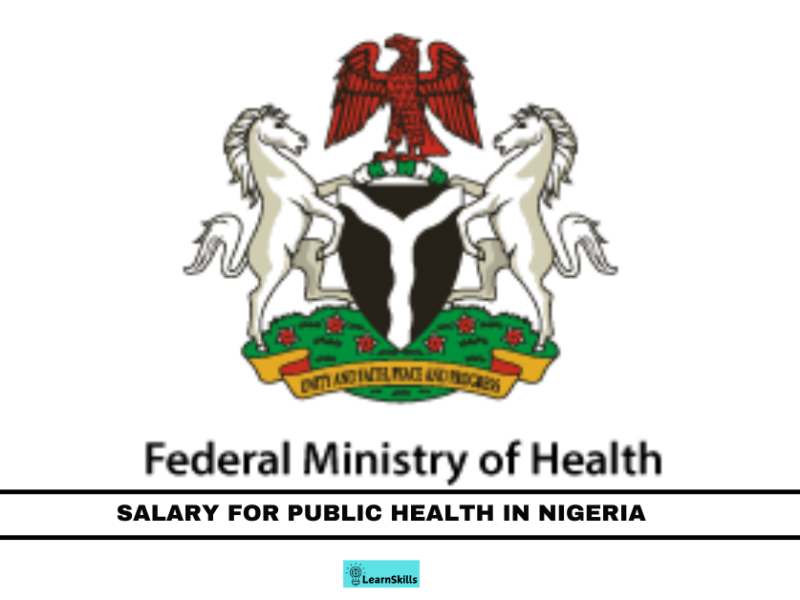Public health is a vital field in Nigeria, focusing on improving the health of communities and preventing disease.
The average salary for public health professionals in Nigeria is NGN 325,000 monthly. Entry-level positions start between NGN 100,000 and NGN 350,000.
Different roles within public health have varying salary ranges. An epidemiologist can earn between NGN 977,000 and NGN 1,000,000, while public health consultants average around NGN 897,102 monthly.
Knowing these salary figures can help you gauge what to expect if you pursue a career in public health in Nigeria.
Current Landscape of Public Health in Nigeria
Various policies and organizational efforts in Nigeria shape the public health sector. Understanding these factors helps to reveal the challenges and progress within the health system.
National Public Health Policies
Nigeria has implemented several public health policies to improve healthcare access and outcomes. The National Health Policy serves as a framework for health development.
Key focus areas include maternal and child health, communicable diseases, and health system strengthening.
The Federal Ministry of Health collaborates with international bodies to establish effective strategies. Policies are designed to address pressing issues such as disease outbreaks, insufficient healthcare infrastructure, and limited access to essential services in rural areas.
Recent initiatives, like the National Strategic Health Development Plan, emphasize community health and preventive measures. These frameworks aim to improve service delivery and mobilize resources efficiently.
Role of Major Health Organizations
Major health organizations are crucial in Nigeria’s public health landscape. The World Health Organization (WHO) provides guidance and support for healthcare improvements. They help tackle diseases, promote health awareness, and strengthen health systems.
The United Nations works alongside the Nigerian government to address health crises and improve living standards. They offer technical assistance and funding for health projects.
The World Bank also contributes through funding and expertise, focusing on health project financing. These collaborations are vital for enhancing healthcare access, particularly in underserved areas.
Together, these organizations work to create sustainable health solutions that benefit the population.
Economic Analysis of Public Health Salaries
Understanding the salary structure in public health can help you navigate your career in Nigeria. The differences in pay between sectors and roles play a significant part in shaping your decisions.
Government vs Private Sector Pay Scale
In Nigeria, public health salaries often vary significantly between the government and private sectors. The average salary for a Public Health Specialist in the government is ₦1,300,000 annually.
In contrast, the private sector can offer a broader range. Salaries for similar roles may vary from ₦20,000 to ₦4,000,000 based on experience and the employer’s resources.
A key advantage of government jobs includes job security and benefits like healthcare. However, the private sector may offer better pay, performance bonuses, and quicker career advancement.
Comparison with Other Medical Professionals
Public health specialists’ salaries are different from other medical professionals in Nigeria. For example, Epidemiologists earn an average of ₦280,000 annually, with ranges starting as low as ₦977 and going up to ₦1,000,000.
Medical officers with a CONMESS grade in public hospitals might earn around ₦180,000 monthly, slightly lower than public health specialists.
This comparison highlights the various earning potentials based on roles within the healthcare system, allowing you to consider your options wisely when pursuing a career in public health or adjusting your career path.
Exploring Public Health Roles
In Nigeria, various public health roles are vital in improving community health. Understanding these positions helps you grasp the dynamics of the field and its impact on society.
Public Health Specialist
As a Public Health Specialist, you focus on improving community health outcomes. This role often involves developing programs to prevent diseases and promote health. You may work in settings like government agencies, NGOs, or hospitals.
In Nigeria, salaries for Public Health Specialists can vary greatly. Entry-level positions may offer around ₦80,000 monthly, while experienced specialists can earn significantly more.
Epidemiologist
Epidemiologists study disease patterns and causes in populations. Your job is to identify health trends and outbreaks to help control diseases. You often collect and analyze data to evaluate health problems.
In Nigeria, epidemiologists can expect salaries ranging from ₦100,000 to ₦350,000 monthly, depending on experience and organization.
Health Researcher
Health Researchers focus on studying various aspects of health and developing strategies for improvement. This role includes conducting studies and analyzing data. You might work independently or as part of a team in laboratories, universities, or health organizations.
In Nigeria, Health Researchers can earn around ₦120,000 to ₦400,000 monthly, influenced by their expertise and the organization’s resources.
Challenges and Opportunities
Nigeria faces unique challenges in public health that impact salaries and job availability. Understanding these issues provides insight into potential growth areas for your career in public health.
Disease Burden in Nigeria
Nigeria has a high disease burden, with diseases such as tuberculosis (TB) and malaria being significant public health concerns. These illnesses affect the population’s health and place heavy demands on healthcare professionals.
- Tuberculosis: Nigeria has one of the highest rates of TB in the world. The need for skilled public health workers in diagnosing and managing TB is critical.
- Malaria: This disease continues to cause high mortality and morbidity. Successful control programs require public health workers to implement strategies and educate communities.
Dealing with these diseases offers opportunities for public health professionals. There is a constant need for innovative solutions, community health education, and effective program management.
Funding for Public Health Initiatives
Funding is a major challenge in Nigeria’s public health sector. Inadequate financial resources affect the availability and quality of health services.
- Investment Needs: Currently, Nigeria spends relatively low amounts on public health per capita. An investment of even $30 more per person could significantly improve health service coverage.
- Income Inequality: Wealth disparities impact access to health services. Lower-income individuals often face higher health costs, creating a gap that public health programs must address.
Despite these challenges, there are growth opportunities. Increased funding and targeted investments in health initiatives can lead to better job prospects and improved public health outcomes.
Future Prospects in Public Health
The field of public health in Nigeria is evolving, opening up new opportunities for career advancement and collaboration.
Career Advancement Paths
In public health, career advancement often depends on your specialization and experience. Key roles include:
- Epidemiologist: You could earn between ₦977,000 and ₦1 million monthly, or an average of ₦280,000.
- Public Health Specialist: This role offers a wide salary range, from ₦20,000 to ₦4 million, with an average of ₦1.3 million.
Further education and certifications are vital. Pursuing advanced degrees can make you more competitive. Data analysis, community health, and policy development skills are increasingly sought after.
Networking with organizations such as the World Health Organization and the United Nations can help you find better job opportunities and projects.
Impacts of Global Partnerships
Global partnerships can significantly shape public health in Nigeria. Collaborations with organizations like the World Health Organization bring in vital resources and expertise.
These partnerships often focus on:
- Training and Education: You can develop local talent through workshops and training programs.
- Funding: Access to grants and funding opportunities can help you engage in large-scale public health projects.
You can implement best practices and innovative solutions tailored to local health challenges by aligning with global initiatives. Such collaborations enhance your professional growth while addressing critical health issues in Nigeria.










